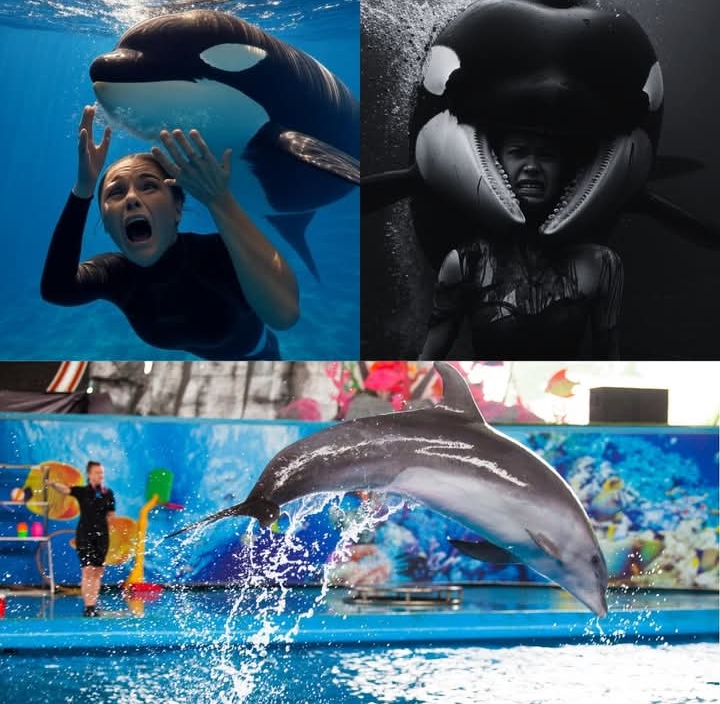She Reached Out to Pet the Dolphin—Seconds Later, the Water Turned Red: Shocking Incident That Silenced an Entire Aquarium -lyly
It was supposed to be the highlight of the trip — a serene afternoon at the OceanBlue where families gathered to watch the highly anticipated dolphin interaction show. Children squealed in delight, cameras flashed, and the performers gracefully leapt through the air. But what unfolded next left the crowd paralyzed in shock, and within seconds, what had been a moment of innocent wonder transformed into a bloody nightmare that silenced the entire facility. Witnesses say the woman, identified as 26-year-old marine biology student Lena Morrison, had just been invited down by trainers as part of the “Dolphin Touch Encounter” — a promotional feature that allowed guests to briefly interact with one of the trained dolphins under supervision. She stepped forward, smiled at the cheering crowd, and slowly extended her hand to pet the dolphin’s rostrum. But in the blink of an eye, the dolphin twisted aggressively, lunged out of the water, and sank its teeth into her forearm, dragging her violently toward the edge of the tank.

What followed was chaos. Screams filled the air as blood spattered across the side of the pool. Lena, still conscious, struggled to pull away, but the animal — a 300-pound male named Echo — clamped down harder and began thrashing side to side. Trainers leapt into action, using poles, whistles, and emergency release cues in a frantic effort to disengage the dolphin, but the animal refused to let go. It took nearly forty-five seconds and two tranquilizer darts before Echo finally released her, retreating to the far end of the tank as Lena was pulled to safety, her arm barely intact. Paramedics arrived within minutes and rushed her to St. Mercy General Hospital, where she underwent emergency surgery. At last update, doctors confirmed her condition was stable but warned of severe nerve damage and the possibility of partial loss of function in her dominant hand.
For onlookers — many of whom were children — the trauma was instant. “One moment everyone was clapping, and the next it was just screaming and blood,” one parent told reporters. “My son won’t stop crying. He loved dolphins. Now he never wants to see one again.” The immediately shut down all interactive exhibits and evacuated the premises, citing a “serious and unprecedented incident.” But behind the official language lies a much darker question: why did this happen? And could it have been prevented?

Multiple sources inside the OceanBlue Aquarium have since come forward anonymously, revealing that Echo had been showing signs of distress and erratic behavior for weeks leading up to the attack. One trainer claimed Echo had recently refused to perform several routines, lashed out during feeding times, and once bit a fellow dolphin during a nighttime session. Despite internal complaints, the show continued as planned. “They didn’t want to cancel one of the most popular attractions during tourist season,” said the whistleblower. “It was only a matter of time.” Experts in marine animal behavior have long warned that dolphins — while perceived as friendly, intelligent creatures — are still powerful wild animals capable of unpredictable aggression, especially under stress or prolonged captivity. Dr. Hannah Blevins, a marine ethologist, noted that “people forget that dolphins have rows of sharp teeth and immense jaw pressure. They are not toys. When their tolerance reaches a limit, they can and do lash out.”
Lena’s family has called for a full investigation and is reportedly considering legal action against the aquarium. “This never should have happened,” said her mother in a tearful statement. “My daughter loves marine life. She wanted to dedicate her life to protecting these animals. Now she may never use her hand again because someone ignored the warning signs.” Animal rights organizations have seized on the incident to once again push for stricter regulations on captive animal performances and interactive programs. “This is exactly why we advocate for the end of these shows,” said a spokesperson for Marine Freedom Watch. “It’s dangerous for the animals and deadly for the people. How many more incidents do we need?”
OceanBlue has since released a carefully worded statement expressing sympathy for Lena and promising a review of safety protocols, but critics argue that it’s too little, too late. “A review doesn’t heal nerve damage,” one commenter wrote online. “It doesn’t erase the screams of a child watching someone get mauled by the animal they were just told was their ‘friend.’” Echo remains in isolated observation, and according to staff, has been largely unresponsive since the attack. The future of the dolphin show — once a flagship feature of the aquarium — now hangs in uncertainty, shadowed by the horrifying memory of a single moment that turned an entire pool red. Whether this becomes a turning point for the industry or just another buried headline will depend on whether the shock leads to lasting accountability — or is simply washed away with the tide.

